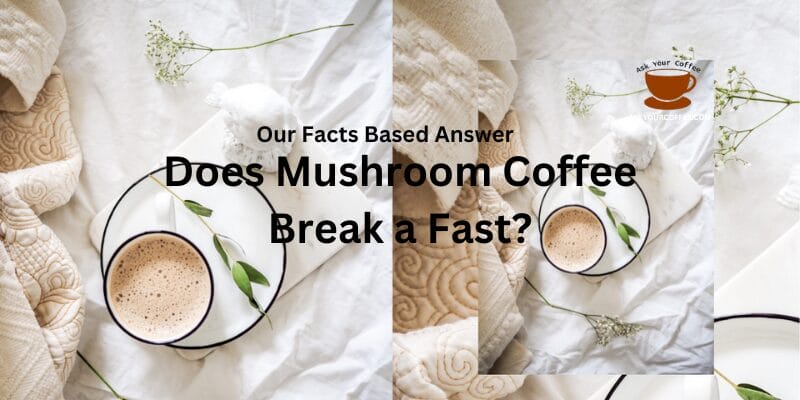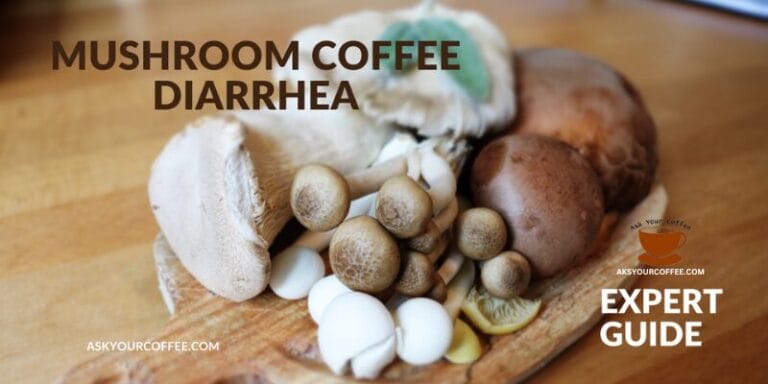Does Mushroom Coffee Break a Fast? Our Facts Based Answer
Welcome to our blog post, Does Mushroom Coffee Break a Fast? where we dive deep into the intriguing world of intermittent fasting and explore whether mushroom coffee breaks a fast or not.
If you are the one who loves their morning cup of joe but also wants to reap the benefits of intermittent fasting, then this article is for you!
We’ll unravel the truth behind mushroom coffee and its impact on your fasting goals. So grab a mug, sit back, and let’s get brewing!
Table of Contents
What is Intermittent Fasting?
Intermittent fasting has gained significant popularity in recent years as a powerful tool for weight loss and overall health improvement. It is an eating pattern that cycles between periods of fasting and eating, with various methods such as the 16/8 method or alternate-day fasting.
The concept behind intermittent fasting is to extend the period without consuming calories, giving your body a chance to tap into stored fat for energy. This can lead to weight loss, improved insulin sensitivity, reduced inflammation, and even increased longevity.
One of the key benefits of intermittent fasting is its flexibility. You can choose a schedule that works best for you and fits into your lifestyle. Some people prefer skipping breakfast and having their first meal at lunchtime, while others opt for early dinners and longer overnight fasts.
During the fasting period, it’s important to avoid consuming any calories or substances that may break your fast. This brings us to the question: does mushroom coffee break a fast? Let’s explore this further in the next section.
The Benefits of Intermittent Fasting.
Intermittent fasting has gained popularity in recent years as a way to improve overall health and aid in weight loss.
It Helps Regulate Insulin Levels: One of the main benefits of intermittent fasting is that it helps regulate insulin levels in the body, leading to improved insulin sensitivity. This can be particularly beneficial for individuals who are at risk for or have type 2 diabetes.
Weight Lose: Another advantage of intermittent fasting is its potential to promote fat loss. By restricting food intake during certain periods, the body is forced to use stored fat as an energy source. This can lead to a reduction in body weight and body fat percentage over time.
Positive Effects on Brain Health: Intermittent fasting has been shown to have positive effects on brain health. It may enhance cognitive function and protect against neurodegenerative diseases such as Alzheimer’s disease.
Improve Heart Health and Reduce Blood Pressure.: Furthermore, intermittent fasting has been linked to improvements in heart health by reducing blood pressure, cholesterol levels, and markers of inflammation.
It’s important to note that while there are many potential benefits associated with intermittent fasting, individual results may vary. It’s always best to consult with a healthcare professional before making any significant changes to your diet or lifestyle.
What is Mushroom Coffee?

Mushroom coffee is a unique and innovative beverage that combines the rich flavors of traditional coffee with the health benefits of medicinal mushrooms. While it may sound unusual, mushroom coffee has gained popularity in recent years due to its potential to improve focus, boost energy levels, and support overall well-being.
The combination of caffeine from the coffee beans and the natural compounds found in medicinal mushrooms creates a balanced drink that provides both mental stimulation and adaptogenic benefits. It’s important to note that mushroom coffee usually contains less caffeine than regular coffee but still delivers an energizing experience without the jitters or crashes often associated with caffeine consumption.
Whether you’re looking for an alternative to your morning brew or want to incorporate more functional ingredients into your routine, mushroom coffee could be worth exploring. Just remember to choose high-quality products made from organic ingredients for optimal results.
Related: Is Mushroom Coffee Safe During Breastfeeding Moms?
Mushroom Coffee Ingredients.
Mushroom coffee is gaining popularity for its unique blend of flavors and potential health benefits. But what exactly goes into this intriguing beverage? Let’s look into the ingredients that make up mushroom coffee.
Mushroom: One key component you’ll find in mushroom coffee is, of course, mushrooms! Specifically, medicinal mushrooms like chaga, lion’s mane, reishi, and cordyceps are commonly used. These mushrooms are known for their various health-promoting properties such as boosting immune function and reducing inflammation.
Cordyceps Mushrooms: One key ingredient often found in mushroom coffee is cordyceps mushrooms. These powerful fungi have been used for centuries for their potential health benefits, including increased energy and enhanced athletic performance. While some argue that these benefits may be beneficial during a fast, others believe that they could potentially break a fast due to their calorie content.
Lion’s Mane Mushrooms: Another common ingredient is lion’s mane mushrooms. Known for their cognitive-boosting properties, lion’s mane mushrooms are believed to support brain health and function. However, when it comes to fasting, there isn’t enough research to definitively say whether consuming lion’s mane mushrooms would break a fast or not.
Chaga Mushrooms: Chaga mushrooms are another popular addition to mushroom coffee. Rich in antioxidants and potentially immune-boosting compounds, Chaga mushrooms have gained attention as a superfood ingredient. Some proponents argue that since chaga contains very few calories per serving, it can be enjoyed without breaking a fast.
Reishi Mushrooms: We have reishi mushrooms – known for their calming properties and potential stress-reducing effects. Like other mushroom varieties mentioned above, reishi contains minimal calories but offers numerous potential health benefits during periods of fasting.
While individual experiences may vary, it’s important to consider these factors before incorporating mushroom coffee into your fasting routine. Consulting with healthcare professionals or nutrition experts can provide personalized guidance based on your specific goals and needs
Organic Coffee Beans: In addition to mushrooms, another important ingredient found in many mushroom coffees is organic coffee beans. The type of coffee used can vary depending on the brand or product you choose. Some may use regular Arabica or Robusta beans while others may opt for specialty blends.
Additional Ingredients: To further enhance the flavor profile and potential health benefits, some brands also include additional ingredients like adaptogens (e.g., ashwagandha), herbs (e.g., turmeric), or even cacao powder for a touch of chocolatey goodness.
It’s worth noting that different brands may have slightly different variations in their ingredient list. So it’s essential to check the label to see precisely what your chosen mushroom coffee contains.
Mushroom coffees offer a unique combination of medicinal mushrooms and traditional coffee flavors. Whether you’re seeking a new taste experience or hoping to reap the potential health benefits these fungi provide – mushroom coffees might be worth exploring!
Types of Mushroom Coffee.
Let’s discuss the types of mushroom coffee available on the market. Various brands offer different blends, each with its unique combination of mushrooms. Some popular options include lion’s mane, chaga, reishi, cordyceps, and turkey tail mushrooms.
Ultimately though, mushroom coffee does have beneficial properties such as boosting cognitive function, stabilizing blood sugar levels, and supporting immune health.
Thus, making an informed decision based on your specific goals and preferences is crucial when determining whether consuming mushroom coffee will align with your intermittent fasting routine
Does Mushroom Coffee Break a Fast?
The answer depends on your definition of “breaking” a fast. From a strict standpoint, consuming anything other than water would technically break the fast since it stimulates digestion and activates certain metabolic pathways. However, when it comes to mushroom coffee specifically, opinions vary within the fasting community.
Which Type and Quantity of Mushroom Coffee Break Your Fast?
Different types of mushroom coffees contain varying ingredients that may affect your state of fasting differently. Some proponents argue that small amounts of calories from mushroom powders do not significantly impact insulin levels or disrupt autophagy (the cellular recycling process).
However, others maintain that any caloric intake interrupts the physiological benefits associated with fasting.
The quantity of mushroom coffee you consume also plays a role in determining whether or not your fast will be broken. Generally speaking, if you stick to one cup (8-12 ounces) of mushroom coffee during your fasting window, it is unlikely to significantly impact your fast.
However, it’s important to note that some experts argue that any consumption other than water might break a fast due to potential metabolic responses triggered by ingesting even small amounts of calories or nutrients.
To err on the side of caution while still enjoying the benefits offered by mushroom coffee during your fasting period., opt for decaffeinated versions or ones with minimal caffeine content. Remember that moderation is key – don’t go overboard with multiple cups throughout your fasting window.
The Controversy Surrounding Mushroom Coffee and Fasting.
While some believe that having mushroom coffee during intermittent fasting does not hinder its effects on weight loss or other health benefits, there isn’t enough scientific evidence available yet to provide a definitive answer. Additionally, individual responses may vary based on factors like metabolism and personal goals.
Alternatives to Mushroom Coffee During a Fast
Before we dive into the specifics of which liquids you can consume during your fast, it’s important to understand that a true fast involves only drinking water. However, due to the decrease in stored nutrients in our bodies compared to previous generations, enhancing your fasting with certain nutrients is crucial to avoid side effects and maximize benefits.
Now let’s discuss specific liquids:
1. Water: Water is an absolute yes during intermittent fasting. However, tap water often contains chemicals such as plastics, hormones, and toxic substances used for purification purposes. Investing in a good water filter or using bottled spring water like Pellegrino (naturally carbonated) ensures clean hydration without compromising your fast.
2. Apple Cider Vinegar: Adding apple cider vinegar to your water is highly recommended while fasting because it aids digestion and helps regulate blood sugar levels without spiking insulin.
3. Lemon Juice: Fresh lemon juice added to water not only provides vitamin C but also inhibits oxalate formation, reducing the risk of kidney stones.
4. Black Plain Coffee: Black coffee is generally acceptable during fasting because it does not significantly impact insulin levels. However, excessive caffeine consumption may disrupt sleep patterns and increase cortisol levels, slowing down weight loss progress.
5. Bulletproof Coffee: Bulletproof coffee involves adding butter or MCT oil to your coffee. While this won’t kick you out of ketosis, it can hinder weight loss if you have a slow metabolism. It’s recommended for beginners but should be monitored closely as you progress on your fasting journey.
6. Half and Half vs Cream: When it comes to creamers in coffee, whole cream is preferred over half-and-half due to its lower carb content (half-and-half contains around 1.6g of carbs per two tablespoons). However, the difference is minimal overall.
7. Green Tea: Green tea and other herbal teas are excellent choices during intermittent fasting due to their health benefits and potential metabolic-boosting properties when heated properly.
8. Coconut Milk: The carb content in coconut milk varies depending on the brand; some have one gram while others may contain more carbs than desired for a fasted state—consider using whole cream instead for minimal disruption.
9. Alcohol: All types of alcohol, including those labeled as “keto-friendly” with no added sugar,
If you’re following an intermittent fasting protocol and looking for alternatives to mushroom coffee during your fast, fear not! There are plenty of options to keep you energized and focused without breaking your fast.
Avoid These Drinks During Fast.
1. Diet Sodas: Avoid diet sodas that contain artificial sweeteners like aspartame, which can negatively impact your microbiome and indirectly affect insulin levels. If you prefer a sweetener, opt for natural ones such as stevia or monk fruit.
2. Bone Broth: Bone broth contains protein and should not be consumed during fasting periods since it will break the fast by triggering an insulin response.
3. Coconut Water: Avoid coconut water while fasting due to its relatively high sugar content (11-16 grams per serving), which can counteract the effects of fasting.
4. Pre-workout Powders: Branched-chain amino acids in pre-workout powders should be avoided during fasts since they trigger an insulin response that hinders fat-burning processes essential for autophagy—the process of recycling old proteins and creating new ones.
The Bottom Line.
As we have explored in this blog post, the question of whether mushroom coffee breaks a fast has sparked much debate and controversy. While some argue that the small amount of calories and nutrients present in mushroom coffee can potentially interrupt the fasting state, others believe that it can be consumed without negatively impacting the benefits of intermittent fasting.
Whether or not you choose to include mushroom coffee in your fasting routine will depend on your personal goals and preferences. If you are following a strict form of intermittent fasting for weight loss or insulin sensitivity, it may be best to avoid any substances that could potentially break your fast.
However, if you are more flexible with your fasting approach and prioritize the potential health benefits associated with mushrooms such as improved cognitive function or immune support, then incorporating mushroom coffee into your fasting window might not be an issue for you.
In conclusion, it’s important to listen to your body and experiment with different approaches to find what works best for you during intermittent fasting. Whether you decide to enjoy a cup of mushroom coffee while fasting or opt for other alternatives instead, remember that consistency and adherence to healthy eating patterns are key factors in achieving long-term success with intermittent fasting.
Frequently Asked Questions – FAQs
1. Will mushroom powder break a fast?
Many people wonder if consuming mushroom powder, such as in the form of mushroom coffee, will break their fast. The answer depends on what your definition of fasting is. Some argue that any substance other than water can interrupt the fasting state, while others believe that certain ingredients, like those found in mushroom coffee, can be consumed without breaking a fast.
2. What mushroom coffee doesn’t break a fast?
If you’re concerned about maintaining your fasting state while enjoying a cup of mushroom-infused goodness, look for options that contain only mushrooms and don’t include any additional additives or sweeteners. Certain brands offer pure mushroom coffee mixes made from organic mushrooms like lion’s mane or chaga.
3. Can you have mushroom coffee while intermittent fasting?
Yes! Many individuals practicing intermittent fasting choose to incorporate mushroom coffee into their routine without considering it as breaking their fast. Since most varieties contain negligible calories and sugar levels are low or nonexistent, they are seen as compatible with an intermittent fasting lifestyle.
4. What kind of coffee doesn’t break a fast?
To ensure you stay within your desired parameters during your fasting window, stick to black coffee – whether it’s regular or infused with mushrooms – as long as no sugars or creamers are added to it.
Remember: Fasting practices may vary among individuals and depend on personal goals and preferences; therefore consulting with a healthcare professional is advisable before making any dietary changes.







